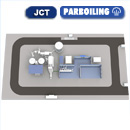Unlocking the secrets to perfect parboiled rice begins with mastering the intricate and precise parboiled rice mill process. From soaking and steaming to drying and milling, each step plays a crucial role in producing the signature nutty flavor and firm texture that sets parboiled rice apart. In this article, we will delve into the art and science behind parboiled rice production, guiding you through the steps to achieve mastery in the parboiled rice mill process.
Understanding the Parboiling Process in Rice Milling
Parboiling is a crucial step in the rice milling process that involves soaking, steaming, and drying the rice before it is milled. This process helps improve the texture, taste, and nutritional value of the rice, making it a popular choice among consumers. By mastering the parboiled rice mill process, rice millers can ensure they produce high-quality rice that meets market demand.
During the parboiling process, rice grains undergo various physical and chemical changes that contribute to their improved quality. Some of the key steps involved in parboiling include:
- Soaking the rice in water to soften the outer layer
- Steaming the rice to gelatinize the starch inside the grains
- Drying the rice to remove excess moisture and prevent spoilage
Key Steps for Achieving Optimal Parboiled Rice Quality
When it comes to achieving optimal parboiled rice quality, there are several key steps that must be followed in the milling process. Firstly, it is essential to properly soak the rice before parboiling. This step ensures that the rice grains are thoroughly saturated with water, allowing for even cooking and helping to retain nutrients.
Next, **steaming** the soaked rice is crucial in the parboiling process. This step involves exposing the rice to steam under controlled conditions, which helps gelatinize the starches in the grain. Proper steaming results in a firm, translucent kernel with a characteristic yellow color. Mastering these key steps is essential for producing high-quality parboiled rice that is both nutritious and flavorful.
Enhancing Efficiency in Parboiled Rice Production
requires a deep understanding of the intricate mill process. By mastering each step, from soaking to steaming, drying, and milling, producers can optimize their output and quality. One key aspect is ensuring precise control over water temperature and duration during the parboiling stage, which directly impacts the final product's texture and nutritional content.
Additionally, investing in state-of-the-art milling equipment and technology can significantly streamline production and reduce wastage. By implementing automation systems for sorting, polishing, and packaging, mill operators can not only increase their overall efficiency but also maintain consistent quality standards. Continuous staff training and quality control checks are essential to guaranteeing the success of the parboiled rice production process.
Expert Tips for Mastering the Parboiled Rice Mill Process
When it comes to mastering the parboiled rice mill process, there are some expert tips that can help you achieve the best results. One important tip is to ensure that your rice is properly cleaned before processing. This will help remove any impurities and ensure a higher quality end product. Additionally, soaking the rice before parboiling can help improve the texture and taste of the rice.
Another key tip is to monitor the temperature and humidity levels throughout the parboiling process. Maintaining the correct conditions is crucial for ensuring that the rice is cooked evenly and thoroughly. Finally, paying attention to the milling and drying stages is essential for producing the perfect parboiled rice. By following these expert tips, you can master the parboiled rice mill process and produce top-quality rice every time.
Insights and Conclusions
In conclusion, mastering the parboiled rice mill process is a gratifying journey that requires patience, dedication, and precision. With the right techniques and equipment, one can achieve the perfect parboiled rice every time. So, roll up your sleeves, sharpen your skills, and embark on the path to becoming a master of the parboiled rice mill process. Happy milling!

